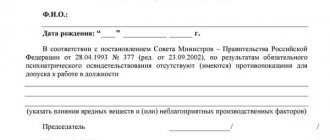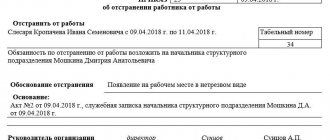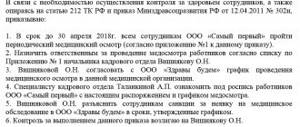When applying for a job, people undergo a medical examination. It may be mandatory in accordance with the Labor Code or contractual when concluding an employment contract on the employer’s terms. This is necessary in order to find out whether the person applying for a job has any contraindications to this type of activity. The mental state of the future employee is also important. Especially for specialties that require exceptional attention and concentration when performing work. Therefore, mandatory psychiatric examination of workers has been introduced. Next, we will consider which professions are included in this list.
Legislation
Mental disorders in a person can be a serious reason for limiting the performance of work duties. Such people, when performing work associated with increased danger or requiring special attention, can cause harm to themselves and others.
When hiring a person, the employer must comply with the rules established by law:
- The main document is Order No. 695 of September 23, 2002. It contains the basic principles on how to conduct a psychiatric examination of employees.
- Article 212 of the Labor Code of the Russian Federation indicates when this examination should be carried out.
- Decree of the Government of the Russian Federation dated April 28, 1993 No. 377 contains a description of working conditions and harmful factors that may become the basis for an employee to undergo training.
- Article 213 of the Labor Code of the Russian Federation contains the grounds for conducting a psychiatric examination.
All these documents are taken into account when developing the “Regulations on undergoing a psychiatric examination” at the enterprise. Compliance with the rules is monitored at the legislative level. The Occupational Safety and Health Officer must monitor compliance with this provision and also keep a record of those who are required to undergo a psychiatric examination.
Which employees undergo psychiatric evaluation?
Not all employees undergo psychiatric examination.
According to Art. 213 of the Labor Code of the Russian Federation, employees carrying out certain types of activities associated with sources of increased danger, as well as those working in conditions of increased danger, undergo mandatory psychiatric examination at least once every 5 years.
The entire list of hazardous factors and types of work can be found in Resolution 377 of April 28, 1993. These are workers who work at heights, catering workers, trade workers, warehouse workers, working with people (medics, educators, trainers, instructors), boiler room workers, machinists , machine operators, workers involved in high-voltage work, explosives, weapons, drivers of any vehicles, etc.
Types of procedure
There are several types of psychiatric examination:
- Periodic, which must be completed over a certain period of time. At the enterprise - every 5 years.
- Mandatory. Depending on the professional activity, it is necessary to undergo a psychiatric examination at work.
- Voluntary. It can be used as an addition to the mandatory one to detect deficiencies or make additions.
- Examination without the permission of the subject. When a person may be a threat to himself and others, a court order is required to conduct a compulsory examination.
- Examination without informing the subject. The examination is carried out for persons who may at times behave inappropriately.
- Psychiatric examination when concluding transactions. For insurance of citizens during the signing of documents, concluding purchase and sale agreements.
What is a contingent list?
The contingent list is a local regulatory act of the organization, which contains information about the professions (positions) of the organization’s employees who are required to undergo pre-employment and periodic medical examinations.
Schematically, the role of the Contingent List in the document flow associated with the organization of medical examinations can be represented as follows:
The documents that are being developed by the employer are indicated in green in the diagram, and the medical organization in blue.
Professions requiring the procedure
Let's consider the list of professions that are subject to psychiatric examination:
- Servicing turning, milling machines and stamping presses.
- Working with boiler and gas equipment.
- Teaching staff.
- Workers in the medical and pharmaceutical industry.
- Machinists.
- Working at height or underground.
- Horse climbers.
- Persons performing maintenance of lifting structures and structures.
- Food industry workers who have contact with food products during their production, sale, and storage.
- Carrying out sanitary treatment and repair of food industry equipment and equipment.
- Transporting food products.
- Drivers.
- Servicing electrical installations with a voltage of 127 V and above.
- Carrying, using, storing firearms.
At enterprises associated with this type of work, mandatory psychiatric examinations must be organized.
Health workers
It should be noted which jobs in medicine and the pharmaceutical industry require a psychiatric examination:
- Production of dosage forms of morphine and its derivatives, antitumor drugs, hormonal, neuroleptics, anticoagulants, anesthetics used in anesthesia.
- The use of neuroleptics in therapeutic treatment.
- Manufacturing of medicines in a pharmacy.
- Production, processing, storage and transportation, use, destruction and distribution, as well as export and import of narcotic and psychotropic substances into the territory of the customs of the Russian Federation.
- Working in dentistry with preparations containing mercury.
- Production of cosmetics containing mercury.
- Production and use of antibiotics, enzyme preparations and biostimulants.
- Production of drugs for the treatment and diagnosis of immunobiological blood products A.
- Working with infected material and infected patients.
- Work with equipment related to ultrasound, lasers and radioactive substances, as well as sources of ionizing radiation.
- Personnel working in specialized medical and emergency care teams.
- Working with psychotropic and narcotic drugs.
- Work with catering in sanatoriums, medical institutions.
- Health workers in maternity wards, children's departments of pathologies of newborns, premature babies and surgeries.
What is a harmful factor
One of the important indicators for who should undergo a psychiatric examination is the presence of a harmful factor at work. What could it be:
- Working with chemicals: mercury, arsenic, metals, benzene, organic solvents.
- Narcotic and psychotropic substances.
- Contaminated and infected materials.
- Aerosols. Dust of plant and inorganic origin.
- Noise, vibration, temperature changes, high atmospheric influences.
- The influence of radioactive substances, lasers, ionizing radiation, electromagnetic fields.
- Eye strain. Increased physical activity.
Psychiatric examination under order 377
Order of the Ministry of Health on psychiatric examination No. 377 contains a list of professions that require regular psychiatric examinations of workers. It presents two large tables: one lists occupational hazards, the other - individual types of professional activities. The regularity of examinations by psychiatrists is prescribed - the employee must undergo them once every five years.
Many professions are associated with increased risks, both for the employee himself and for the people around him. The employer by law cannot allow people with mental disabilities to perform these types of work.
A psychiatric examination is not the same as a medical examination, and it is not part of it. This is a separate procedure.
ProfMedLab is a clinic that is authorized to conduct psychiatric examinations on the basis of license LO-77-01-017869 dated 04/12/2019. and an official letter from the Ministry of Health of the Russian Federation.
Which employees need a psychiatric evaluation?
Order No. 377 on psychiatric examination of workers presents a long list of harmful factors:
- First of all, this is contact with various chemicals, there are several dozen of them listed. For example, here are listed: arsenic, mercury, hydrogen sulfide, metals, benzene, phenols, formaldehyde, organic solvents, etc.
- People who work with drugs and psychotropic drugs, other pharmacological drugs, antibiotics, biostimulants, allergens, blood products, immunobiological and enzyme preparations must be mentally healthy.
- People dealing with material contaminated with infections, helminths, pathogens of Q fever, brucellosis.
- Working with aerosols, contact with dust of inorganic, plant and animal origin.
- Contact with radioactive substances, exposure to ionizing radiation, lasers, electromagnetic fields.
- Impact of physical factors: noise, vibration, low and high temperatures, increased atmospheric pressure.
- High physical activity, work associated with eye strain.
Diseases affecting professional suitability
Depending on what position or profession is being considered, not only existing mental illnesses are taken into account, but also:
- Presence of alcohol dependence.
- Whether the person suffers from substance abuse or drug addiction.
- Epilepsy.
- Frequent neuroses.
- Do you faint?
- Personality disorder.
- Mental retardation.
- Speech disorders stuttering.
If someone who must undergo a psychiatric examination has the conditions described above, the commission may make a negative decision. If the employee does not agree with such a conclusion, then he has the right to have the examination repeated.
Procedure implementation plan
Let us highlight the most important points of the psychiatric examination:
- Issuing an order to conduct a psychiatric examination and appointing responsible persons.
- Identification of positions and specialties at the enterprise that require psychiatric examination.
- Concluding an agreement with a medical institution to conduct an examination.
- Issuing a referral for a psychiatric examination.
- The employee must undergo an examination at a medical institution designated by the employer.
- The commission's decision is issued to the employee. The message is transmitted to the enterprise.
The decision also indicates the date of the next psychiatric examination.
Where can you undergo a psychiatric examination in St. Petersburg
Psychiatric examination in St. Petersburg can be completed at any medical institution that has the appropriate license. These can be both government institutions and privately owned medical centers. To conduct a psychiatric examination of employees, the employer must enter into an agreement for the provision of medical services. When deciding where to undergo a mandatory psychiatric examination of workers in St. Petersburg, you should first contact psychoneurological dispensaries.
Before being hired, an employee does not have the opportunity to undergo an examination on his own: it must be carried out exclusively at the direction of the employer. The latter does not have the right to replace the psychiatric examination and the decision of the medical psychiatric commission with a certificate from a psychiatric dispensary stating that the employee is not registered.
Medical provides professional licensed medical services for conducting psychiatric examinations of workers of all categories. Our specialists will carry out all the necessary examinations as soon as possible, and you will receive objective indicators of the mental health of your employees in the form of a Medical Commission Decision on suitability for work.
Who is responsible
The law places full responsibility for the procedure for undergoing a psychiatric examination on the enterprise.
Failure to comply with the law will result in fines of up to 25,000 rubles for officials, up to 130,000 rubles for legal entities, and up to 25,000 rubles for entrepreneurs. At an enterprise or organization that has employees performing work included in the list of RF PP No. 377, a mandatory psychiatric examination of employees must be organized in accordance with established norms and rules.
An employee who refuses to submit to a psychiatric evaluation may be terminated from his position and may also be prevented from returning to work by other means. Art. 76 of the Labor Code allows not to accrue wages to an employee due to refusal to undergo an examination or medical examination.
Anyone who must undergo a psychiatric examination can write a statement about maintaining wages and work place for the period of the commission.
The employer has the right to refuse to provide a vacancy if such an examination is not passed.
If an employee refuses to undergo examination
- How to challenge an unlawful refusal to hire
The procedure is voluntary. At the same time, according to Art. 76 management is obliged to remove an employee who does not pass it. During the period of suspension, an employee who does not pass the examination of his own free will will not be paid.
According to Art. 214 employee must undergo a mandatory psychoneurological examination. If you refuse, management has the right to take disciplinary measures: make a reprimand, issue a reprimand. If the person sent refuses further, the contract is terminated under clause 5, part 1, art. 81 Labor Code of the Russian Federation.
If the commission finds the applicant unfit
- How to fill out an applicant application form when applying for a job
The applicant may be offered additional examination in order to transfer to another position.
If there are no vacancies in the organization to which the employee can be transferred in accordance with the conclusion, he will be fired under clause 8 of part 1 of art. 77 Labor Code of the Russian Federation.
Algorithm
Whether it is worth undergoing a psychiatric examination, the employer decides for himself, based on the Decree of the Government of the Russian Federation on psychiatric examination, which lists harmful occupational factors that require regular examination by a specialist:
- The enterprise creates a commission that assesses working conditions.
- The activities are assessed for the presence of harmful factors in accordance with Government Decree No. 377.
- A psychiatric examination is organized.
- The employee is given a referral for a psychiatric examination. It must be completed within 20 days.
Who should be sent for a psychiatric examination?
This is an important question for most employers and not an easy one to answer. The fact is that Order No. 377 specifies certain substances and physical factors, but does not specify minimum “harmful” exposure levels. Theoretically, any employee can be included in these lists, even an office worker who spends most of the working day at the computer. The question is how picky the representatives of regulatory authorities will be. As practice shows, first of all they “ask” for drivers, electricians, people who work at heights (more than 1.5 m above the ground), come into contact with harmful chemicals, deal with food, health workers, teachers and educators.
Order No. 377 on psychiatric examination and Resolution No. 695 of the Government of the Russian Federation of September 23, 2002 are two documents that operate together. The main essence of Order No. 377, as we have already figured out, is a listing of professions and harmful occupational factors that require regular examinations by a psychiatrist. Decree No. 695 lists the basic rules. We talk about this document in a separate article.
You can read the full text of Order No. 377 at this link.
For more information about psychiatric assessments, please contact us at: +7 (495) 120-81-30.
Rules for passing a psychiatric examination
Here are the main ones:
- The employee must present: passport, health passport.
- The doctor conducts a conversation for 30-40 minutes, asking certain questions.
- Non-standard and awkward questions may be asked.
- A conclusion is issued against signature.
- The employer is informed of the date of the decision and issuance of the certificate.
Let us note what signs during examination may indicate mental disorders:
- Incoherent speech.
- There is no logic in the answers.
- Abstract thinking is very weakly expressed.
The employer's mistake may be that he accepts certificates of completion of a psychiatric examination from a dispensary. A fine is imposed for such a violation. A medical report is different from a psychiatric report.
How to conduct a psychiatric examination: step-by-step algorithm
Psychiatric examination of employees must be planned in advance, since this activity requires significant financial and time expenditures. The OPO procedure can be represented as a step-by-step algorithm.
Use a table. It will help you take into account all the nuances.
| Stage number | Event name | Our tips |
| 1 | Identification of harmful and dangerous production factors, as well as types of work during which hazardous production is carried out | A psychiatric examination does not begin with the conclusion of an agreement with a psychiatric hospital. It is necessary to determine which categories of employees are subject to SAR. Unfortunately, the list of contingents and the list of names for periodic medical examinations will not be suitable here, because the names of the factors in Order of the Ministry of Health No. 302n and in Resolution of the Council of Ministers No. 377 are different. Therefore, simply changing the names of the tables will not work. At the same time, since both for hazardous production and medical examinations, not only the results of the special assessment system are used, but also an analysis of the production activities of the enterprise, the general methodological approach can be duplicated. |
| Study of regulatory documents in the field of hazardous production, as well as regulations of constituent entities of the Russian Federation | ||
| Process Analysis | ||
| Analysis of SOUT results | ||
| Drawing up a list of positions and professions of workers for whom PPO is carried out | ||
| 2 | Determination of approximate costs for carrying out public benefit activities | |
| Drawing up a name list of employees subject to public education | The occupational safety specialist compiles a list of professions, then personnel officers must compile a list of full-time employees by name. Immediately before concluding a contract (agreement), be sure to update this list to draw up a specification. | |
| Analysis of the average annual number of newly hired employees | In the contract (agreement), enter the number of employees multiplied by the forecast of hired employees. Not every newly hired employee is subject to SAR. Therefore, if there are a lot of employees being hired, you can set aside a 10-15% reserve. | |
| Search for suppliers and request for commercial proposals | Unfortunately, the employer is very limited in the choice of service providers, and in some regions of the federation there is generally a monopoly, and, accordingly, a single price. Therefore, if orders on the creation of a commission are not published on the website of the Departments of Health, write a written request to the subject of the Federation. Let them confirm to you which specific organizations can conduct public benefit organizations. If you are sent a response indicating that such commissions have not been registered, make the appropriate decision - either conduct an OPO in any psychoneurological dispensary, or in another constituent entity of the Russian Federation. When negotiating with managers of sales departments of paid services of medical organizations, lower the price. Say directly that you just called another medical organization, and they gave a lower price. You can also agree that your employees will bring to the commission an electroencephalogram that they received during a periodic medical examination. Naturally, such an EEG should be no later than 1 year, and also in a high-quality description by a doctor. Perhaps they will meet your needs, and this will reduce the cost of the OPO by almost half. But not all institutions agree to this. Therefore, negotiate, come to a compromise. | |
| Drawing up a budget for conducting public education | Having found out the price of the OPO for one employee, determine approximately how much time it will take for the entire examination procedure, draw up a calendar schedule, and distribute the costs for the year. Remember that the costs of public health facilities are not financed by contributions for injuries from the Social Insurance Fund. Therefore, you can safely carry out such an examination throughout the year, including in the fourth quarter. | |
| 3 | Preparation of an order to conduct a public safety assessment | Download the template for the order, list of professions and positions and referral to public education at the beginning of the article |
| Familiarization of employees with the order and schedule of the OPO | When familiarizing employees with the order, you can give them instructions on how to pass the OPO. The instructions should indicate which documents you need to take with you. | |
| 4 | Conclusion of a contract (agreement) for carrying out public safety training | The OPO has a characteristic feature that distinguishes it from the medical examination procedure. If a medical examination can be carried out in any organization, even in a small private clinic, even in a military hospital, with the appropriate license, then a psychiatric examination can be carried out only in those organizations that are authorized for this by order of the Department of Health of a constituent entity of the Russian Federation (the cities of Moscow, St. -Petersburg, as well as regions, territories, republics, autonomous districts). For example, a list of medical organizations established by the Department of Health of the city of Moscow, to which the right to form medical psychiatric commissions is delegated, appointment by order of the chief physician of the State Budgetary Healthcare Institution, on the basis of paragraph 7 of the appendix. to the order of the Moscow Department of Health of September 1, 2021 No. 628, consists of only 4 organizations, taking into account the changes made by the order of the Moscow Department of Health of 08/17/2018 No. 562. |
| 5 | Issuing referrals to public education institutions | Remember: issuance of all referrals, both for medical examination and for public health education, is carried out not by an occupational safety specialist, but by a personnel officer! A personnel officer has permission to work with personal data in accordance with his job description, but an occupational safety specialist a priori does not have such a responsibility. |
| 6 | Organization of accounting and storage of the results of educational training | The recording and storage of medical decisions is also carried out by the personnel service. Such information cannot be stored in the labor protection service; this violates the Regulation on the Confidentiality of Personal Data. After all, the labor protection service is not the operator for processing personal information about employees, and the disclosure of such information, voluntary or involuntary, will lead to big problems, including fines. |
Separately, it is necessary to say about the actions of the employer in the presence of contraindications, if the employee refuses to undergo a psychiatric examination.
Remember that PPO cannot be carried out forcibly. Resolution No. 695 states that undergoing general educational training is voluntary. In this case, we are talking about the fact that the employee has the right to write a written refusal to the psychiatric commission. Such a refusal will be recorded and information about the refusal will be transmitted to the employer. Consequently, an employee may refuse to undergo an OPO, but not in front of his employer, but in front of doctors.
Attention! Refusal to receive a referral to OPO, as well as refusal to visit the commission, is grounds for bringing the employee to disciplinary liability and removal from work, according to Article 76 of the Labor Code of the Russian Federation.
The thing is that Article 214 of the Labor Code of the Russian Federation directly states that the employee is required to undergo general training. If he refused before the commission, upon receipt of this information, the employer will remove him by order on the day of receiving the information from the medical commission. If an employee refuses to undergo a public safety assessment before the employer or his legal representative, he should not only be suspended from work, but also subject to disciplinary action. Dismissal may also be a disciplinary measure of last resort.
Differences
It is worth noting that a medical commission and a psychiatric examination have significant differences. Even if there is a psychiatrist on the medical board, this is not a psychiatric examination.
Let's highlight a few differences:
- The medical examination is carried out on the basis of Order of the Ministry of Health No. 302n dated 04.2011.
- Psychiatric examination - on the basis of Government Decree No. 695 of 09.2002.
- The medical commission includes a psychiatrist, its composition is approved by the Ministry of Health.
- The composition of the commission for a psychiatric examination is approved by the medical institution, regardless of the form of ownership of the enterprise.
- The medical examination reflects the presence or absence of medical contraindications to work.
- A psychiatric examination determines whether there are psychiatric contraindications or not.
- A medical examination must be completed once a year.
- They undergo a psychiatric examination every 5 years.
What if a person has mental disabilities?
Basic provisions for conducting a psychiatric examination
Resolution No. 695 on voluntary psychiatric examination puts into effect the Rules for compulsory psychiatric examination (hereinafter referred to as the Rules). The document consists of 10 articles and refers to other regulations in force in the Russian Federation. Let's look at the current Rules article by article and provide practical comments to each point.
1. According to the Rules, the list of professions for which a psychiatric examination is mandatory is determined by Resolution No. 377 of April 28, 1993 (hereinafter referred to as the List). This document explains the rights of citizens when it is necessary to provide mental health care, and also asserts guarantees for the observance of such rights. The list must be used to determine positions that are subject to certification requirements. On its basis, an enterprise or organization draws up an order to conduct a psychiatric examination of employees and sends them to undergo an examination.
2. The rules establish that undergoing a psychiatric examination under Order No. 695 must be carried out voluntarily by the employee, in accordance with the requirements of the Law “On Psychiatric Care and Guarantees of Rights in Its Provision.” In practice, this standard is the biggest pitfall for officials of enterprises and organizations responsible for labor safety. If an employee refuses to undergo a voluntary examination, the management of the enterprise (or organization) is obliged to remove him from his duties. The employee cannot be at his workplace and may be transferred to work that does not require a psychiatric examination.
3. The main purpose of a psychiatric examination is to establish the suitability of a particular employee to perform the work specified by the employer. The area of responsibility of the medical commission is not limited to identifying a mental disorder. The main task is to establish whether a person with an identified diagnosis can perform his job duties without threatening the safety of himself and others. It is important to correctly describe the working conditions in the direction issued to the employee. It must be complete and detailed, allowing psychiatrists to give the most objective assessment possible.
4. As Order No. 695 on psychiatric examination indicates, the medical commission is organized by the health authority. This is necessary to conduct an independent expert assessment, without the participation of representatives of the employer. A medical institution can have any form of ownership, but must have a license to conduct psychiatric examinations.
5. An employee examination, according to the Rules (Order No. 695), must be carried out at least once every 5 years. This is where the second pitfall in the legislation arises. After the expiration of the five-year period, the employer is obliged to send the employee for a re-examination, but at the same time he cannot be allowed to perform his work, since the validity of the previous examination conclusion has already expired.
By law, an employer may not pay an employee wages, which puts him in a difficult financial situation. From a legal point of view, the most correct and effective way to circumvent these norms is to write an application on behalf of the employee to undergo a voluntary extraordinary examination, which will allow him to maintain his average earnings during the examination period.
6. Clause of the Rules (Order No. 695) determines the list of documents required for an employee to undergo examination by a medical commission. This includes a referral from the employer with a mandatory indication of the type of activity, a list of working conditions that may increase the risks of safe performance of work. In addition to the referral, the employee must provide a passport (or a document replacing it).
In practice, when undergoing an examination by a medical commission, you may need an employee’s medical card, a certificate from a psychoneurological dispensary, a military ID and other documents. By law, a medical institution has the authority to independently request the required documents from territorial medical institutions, but this can take quite a lot of time. To speed up the receipt of the conclusion, the employee is recommended to take all the necessary papers with him.
7. The period for conducting the examination is 20 days from the date of the employee’s application. If it is necessary to request additional documents, the commission may accept an expert opinion within 10 days from the date of their receipt.
8. The rules for conducting a psychiatric examination establish the employee’s right to receive any explanations about the work of the commission of a medical institution that are related to the examination.
9. A medical commission consisting of at least 3 people must make a decision by a majority vote. The examination conclusion must indicate the compliance/non-compliance of a particular employee with the position held, taking into account the characteristics of the working conditions specified in the direction. The medical institution must issue completed conclusions to the employee against signature within 3 days after their approval. For the purpose of control, the employer is simultaneously informed about the dates of the conclusion and the issuance of the decision to the employee.
10. An employee may disagree with the conclusion obtained as a result of a psychiatric examination. To do this, you must file a claim in court. In practice, the procedure for conducting an examination presupposes the possibility of re-examining an employee if he disagrees with the conclusion.
Support for citizens
There is a Law “On psychiatric care and guarantees of the rights of citizens during its provision.” It includes articles that regulate the provision and principles of assistance:
- Art. 1. Help is guaranteed by the state. Its provision must respect all human and civil rights.
- Art. 2. All relations are governed by regulatory and legal documents.
- Art. 3. The law is applicable to both citizens of the Russian Federation and foreign persons.
- Art. 4. Assistance must be provided upon the voluntary application of a citizen.
- Art. 5. Persons with mental disorders have all the rights and freedoms of citizens, according to the Constitution of the Russian Federation.
- Art. 6. There are types of professional activities for which a person may be unsuitable due to a mental disorder.
- Art. 7. When providing psychiatric care, a representative may be invited to protect the rights of the patient.
- Art. 8. Prohibition of requiring information about mental health status.
- Art. 9. Information about the patient’s mental health is a medical confidentiality.
- Art. 10. Diagnosis and treatment of patients is carried out according to generally recognized international standards.
- Art. 11. Consent to treatment is given in writing.
- Art. 12. Refusal of treatment is certified by signature.
- Art. 13. Compulsory treatment is applied by court decision.
- Art. 14. Forensic psychiatric examination is carried out in accordance with the procedure established by law.
Based on the legislation, a person has the right to undergo treatment. At the same time, he decides whether to transfer his personal data and information to third parties and enterprises or not.
Making a diagnosis is, first of all, an opportunity to undergo treatment. Also, some diseases require registration of disability. The state provides support for treatment, social assistance, and pensions. When applying for a job, a reduced working day, 30 days of paid leave and 60 days of unpaid leave per year are possible.
List of professions subject to software (according to Regulation No. 377)
This resolution, the full name of which is: “On the implementation of the law of the Russian Federation “On psychiatric care and guarantees of the rights of citizens in its provision,” contains a list of professions for which applicants and existing employees are required to undergo a psychiatric examination:
- Drivers of any vehicles - mopeds, motorcycles, mini tractors and tractors, trams, buses, trolleybuses, cars and trucks, minibuses, wheelchairs and vehicles for the disabled, etc. (the list is specified in the resolution).
- Vehicle dispatchers, traffic controllers.
- Climbers, high-altitude workers and personnel servicing lifting structures.
- Fellers, rafters and transporters, forest protection and other related professions.
- Electricians who perform installation, adjustment, testing of high-voltage lines, servicing installations with voltages above 127 V.
- Boiler house workers, machinists, gas inspection specialists.
- Gas and oil workers working underground and/or in remote areas. This also includes those who work in the Far North, are engaged in geological exploration, offshore drilling, and are at meteorological stations.
- Cash collectors, security guards (carriers of firearms), emergency medical services, all rescue services, firefighters.
- Working on different types of machines: milling, turning, etc., presses.
- Workers servicing high pressure vessels.
- Participating in transport work, including on the territory of the enterprise.
- People working in fire hazardous conditions, with explosives and chemicals.
- Doctors, trade workers, food industry workers, food warehouses, catering workers.
- Employees of educational and educational institutions - schools, boarding schools, kindergartens, etc.
- Hotel and hostel staff.
- Livestock farm employees.
- Those employed in the field of consumer services - hairdressers, bathhouse attendants, manicurists, beauticians.
- Workers servicing waterworks.
- Pool trainer.
- Those who have access to narcotic and psychotropic substances due to the nature of their work.
This is only a part of the professions, and the full and detailed list of Decree No. 377 takes several pages. A few words should be said about such a detailed list of drivers. Since a vehicle a priori poses a danger to both road users and pedestrians, every driver must undergo a psychiatric examination within the prescribed time frame. This is immutable, no matter what the vehicle, the driver’s experience and the nature of the cargo.
As for teaching staff (teachers, educators), their work is very complex, as it is associated with children, high responsibility and mental stress. The examination allows you to see emerging problems in a timely manner and make sure that a person is suitable for such a very difficult job.
The document in question also indicates contraindications in the field of mental health for applicants for the above vacancies:
- epilepsy;
- the presence of chronic mental disorders, accompanied by frequent exacerbations and severe manifestations;
- mental retardation;
- drug addiction, substance abuse, alcoholism.
Specific types of activities also have their own additional restrictions.









